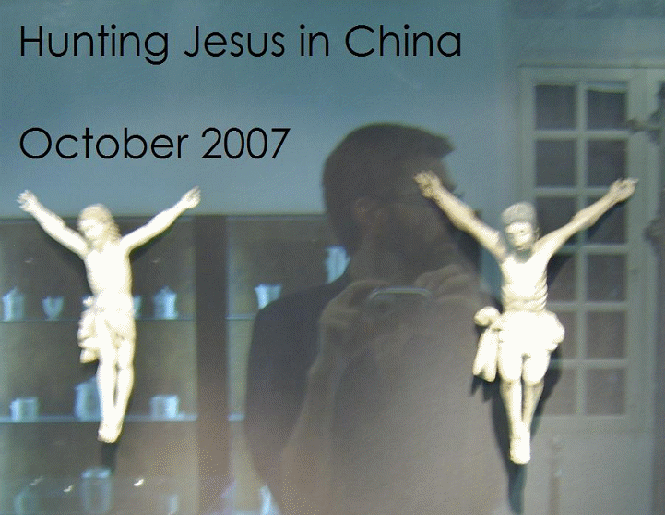

PART I: HONG KONG
Worst hotel ever, following the second-worst flight ever. The Cathay Pacific staff was as polite as they're reputed to be. The (four!) movies had such bad audio that I had to rely on Chinese subtitles to understand them. The food was fine going down (I had called ahead to ask them to not have dismembered bodies parts of animal carcasses placed in front of me), but then my stomach—presumably excited about China getting the Olympics in 2008—begins to practice . . . judo, handball, and, I believe, skeet shooting. I spend the second half of the flight uncomfortably, and steal a Cathay Pacific airsickness bag in case I can't make the hotel.
The hotel is _totally_ unmarked. I stop at a pet store to ask for directions. “Hotel?” Pet store employee points out the entrance way, and gives me a sympathetic pat on the back that I don't understand until I'm in the hotel room. The hotel room is almost a perfect fit--“almost” because when I stretch myself diagonally with my toes in one corner of the room, the spikes of my hair are still half a handspan away from the opposite corner of the room. A very globalized graffiti covers the walls. “Kalau Peujan will always want you for her sweatheart.” At first I think the last word is a typo, but I realized that I too am drenched with sweat, having dressed for a Canadian (or a Beijing) October while searching for the hotel in a sauna-tropical hot-humidity.
It occurs to me that Boddhidharma's arrival in southern China, in the 6th century, is in every way better than my own. I sit facing the graffitied wall for a while. I imagine what my hotel room would be like if I were SSHRC funded. I wonder what the SSHRC selection committee is doing now, probably dining with the governor-general. I giggle myself to sleep.
The next morning. The shower is fabulously hot. Feeling fabulous. All is forgiven.
Research calls. First stop is the University of Hong Kong's museum and art gallery, which houses a fine collections of Christian crosses (some decorated with swastikas) and some images of the eighth-century Daoist Patriarch Lu”, who interests me because he lived 1.5 km away from the first Christian missionaries in China and is famous for doing things like turning water into wine, healing the blind and the lame, and feeding hundreds of monks with a single fistful of flour. I take the ferry across the harbour to Hong Kong's Museum of Art, which had a couple interesting Jesuses in an exhibit of objects from the British Museum in London, but was most enjoyable for a life-sized copy of the Qingming scroll, the best painting ever produced in China (I dedicate an entire lecture to it in the China survey).
Can you find my hotel in this picture? (Hint: In the alleyway behind the hanging baskets!)

The best part of Hong Kong was two dinners with friends. Lidia is a fellow alumnus from the Beijing Language and Culture University. She explains to me that Hong Kong = Beijing minus Noise plus Clean minus Great Food—although she takes me to dinner in a restaurant with delicious classic Hong Kong dishes such as mutter paneer and mango lassi. She lives in Kennedy Town, my favourite part of Hong Kong, as it's (relatively) quiet and is at the water's edge. The next dinner is with the wise Dee (Who Shall Be Rich!) from my Buddhist group, who took me to a lovely vegetarian dinner. We discussed our common enthusiasm for Bristol in the UK, and she explained how much she liked British lasagne and how she can bend the universe to her will.
Picture of Kennedy Town:
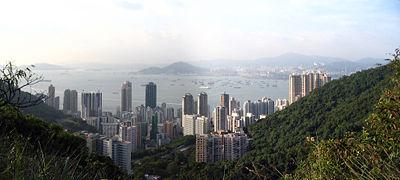
On
a scale from zero to ten naples, Hong Kong earns six naples. It's
crowded and expensive but convenient and easy to navigate. It
doesn't feel exotic enough for my taste, and apparently the feeling
is mutual, since this is the first time I've been in China when
nobody has stared at me like I was a 1.94m space alien, or
like I'm Adam Buxton's Maurice Colon. The lack of attention confuses
me.
I leave for Macau on the ferry. Roughest ferry crossing I've experienced, but I love it. I'm in the third row, and two passengers in the first two rows are violently ill. I helpfully offer my stolen Cathay Pacific sickness bag. Sea travel is still far more dignified than air travel.
PART
II: MACAU
Macau is amazing. At the same time it's Portugal and China and Mexico City and Las Vegas. These instant, multiple familiarities deeply please and disorient me. The seedy 1930s Shanghai scenes from Indian Jones and the Temple of Doom were filmed here. Strange to see Chinese young people with Mediterranean 'tudes buzzing about on motorinos. My hotel is $20/night more expensive than my closet in Hong Kong, and it's luxurious. In fact, a little too luxurious for Goldilocks, so I find a side entrance to use routinely. In Lisbon I quite liked being saluted by people in uniform—there's something so melancholy about soldiers who lost an empire but keep their automatic sidearms—but here it seems pretentious and out of place. Generally I like the hotel each day until 11am, when the restaurant stops serving banana splits and cheesecake (both considered breakfast!).
Indeed, in Macao dead-animal Portuguese cuisine and dead-animal Chinese cuisine conspire against me, and starvation or Pizza Hut becomes a very real possibility. Luckily one night out of the corner of my eye I see at the end of a sidestreet a sign that says 餃餃, indicating jiǎozi—the dumplings that are one of north China's two gifts to food. The owner speaks no Portuguese or English, but knows enough Mandarin to tell me that the vegetarian dumplings I'd ordered are not vegetarian (!) but she would find some that were. The food is delicious. I won't die in Macao.
Spot the 餃餃 in this photo and avoid starvation!
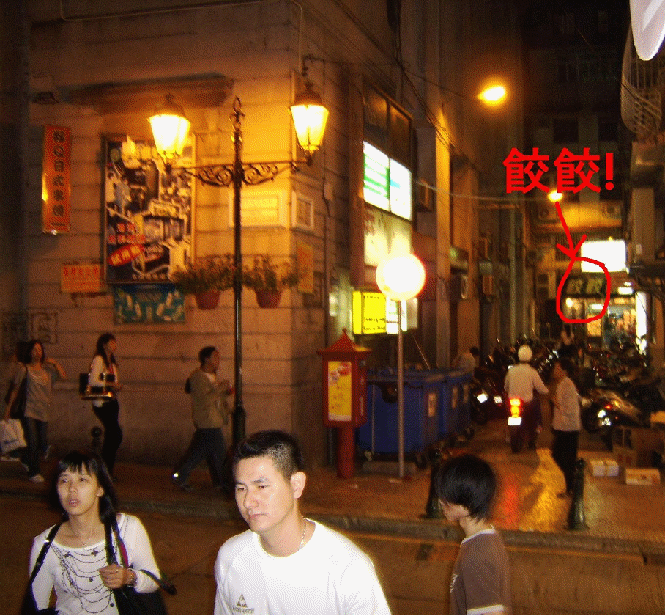
Although most of my expert friends had told me that English would get me farther than Mandarin in Hong Kong and Macau, in both places I don't have to go far off the tourist track to find people only speaking Mandarin. I'm later told that this is a very recent phenomenon.
Like in Hong Kong, nobody gives me a second glance. The only exception is one Chinese woman who mistook me for a world-famous chess champion(!). We talked a bit. She had travelled in Europe, and agreed with me that German food was better than south China food, although she stressed repeatedly that even south China food was better than English food (“blood pudding!”).
Macau: eight out of ten naples.
All that's left of the Jesuit church:
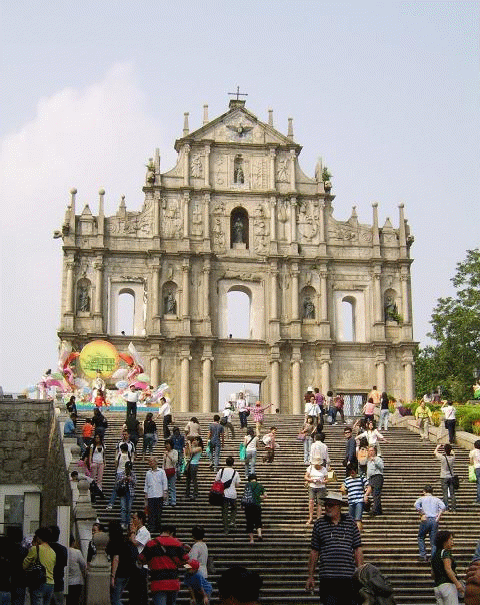
The America-Canada Tutorial Centre in Macau is, sadly, closed. I'm not sure if it's to help Yanks become Canuckis or vice versa:

A
public washroom for doggies, very civilized!
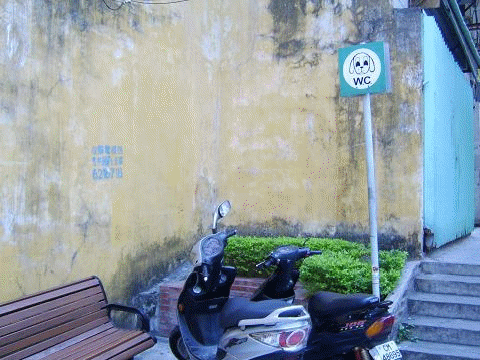
Very detailed instructions, in three languages, on how to dump garbage!
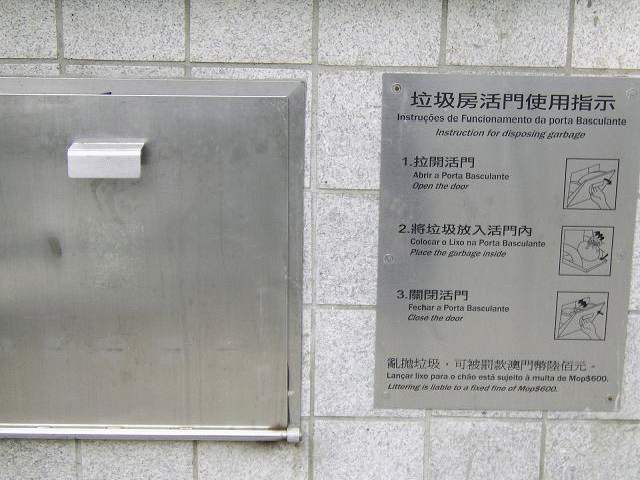
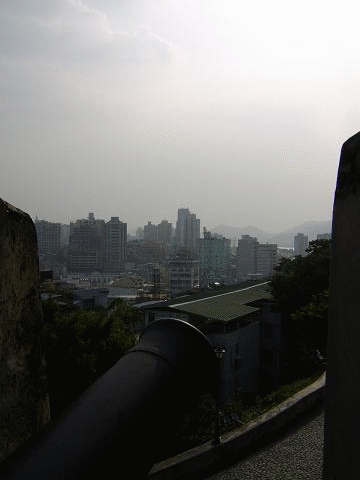
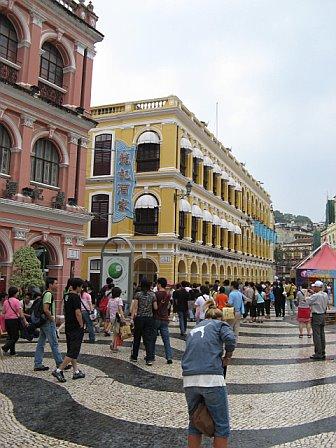
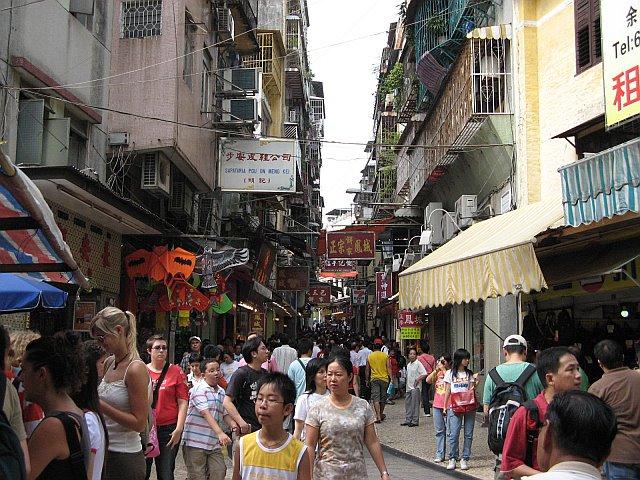
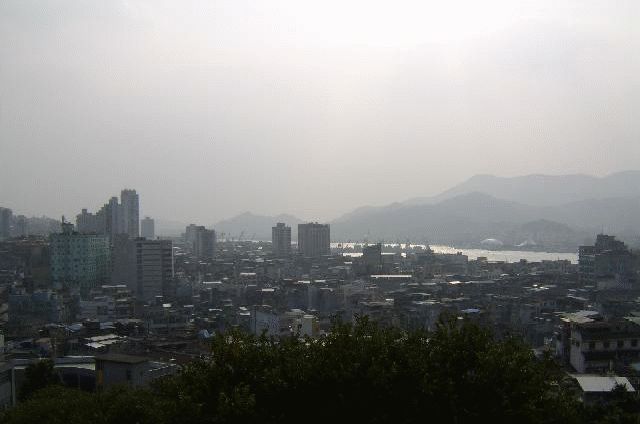
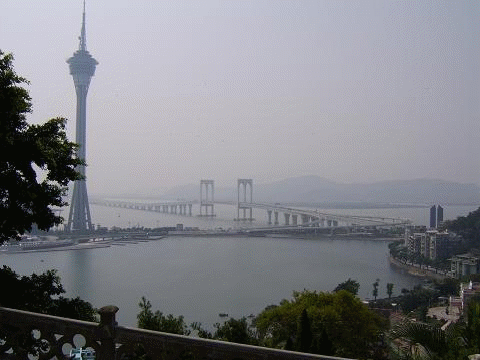
I spend most of the time in Macau doing research. Among my finds are jigsaw-puzzle crosses (easier to transport when broken apart?)...
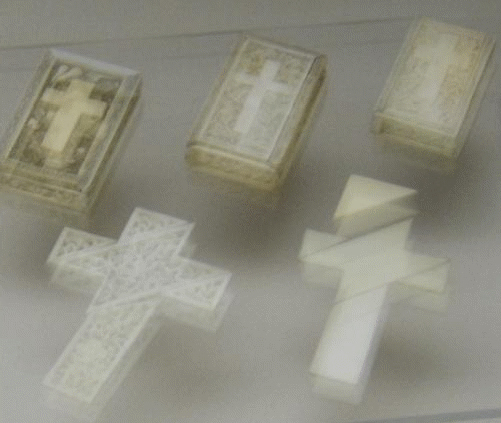
...and an official Society of Jesus match holder!
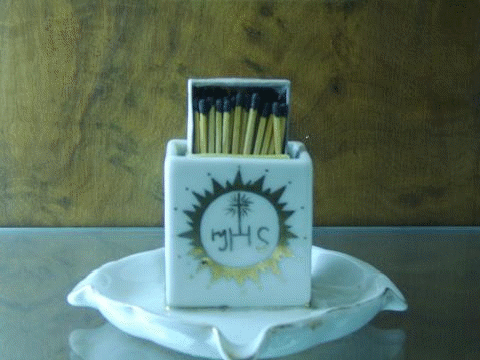
The AirChina flight from Macau is fine, and the food is fine, veggies, noodles, and melon slices. The stewardess gives a small tub of Haagen-Dazs ice cream to everyone except me. She explains, not unkindly, that because I asked not to have dismembered bodies parts of animal carcasses placed in front of me, my dessert was the melon slices.
PART
III: BEIJING
Why is everyone staring at me? Leaving campus the first night, I cross the street, turn the corner, and already see out of the corner of my eye someone aping my bouncing gait. Lots of shocked gapes from the locals throughout my four days. Nice to be back to normalcy.
The conference goes well, except for the Clossey paper which was never really sure if it was addressed to the half dozen senior anglophone world historians or the scores of learning-English Chinese students. Unfortunately not all the speeches were translated, so I wasn't able to follow the Chinese papers very well. It was most useful in giving Chinese and western world historians a chance to get to know each other. I was glad to see my old friends Ms Li and Mr Chen, now both doing postdocs, and to meet many new friendly Chinese students. We go to visit the oldest mosque in Beijing, and Mr Chen and Ms Li gift me with an erhu. It is very difficult to play skillfully, but I explain I want to play it in a pop-punk style, which requires only two chords and lots of volume.
Beijing's oldest mosque (no Jesus located on premises):
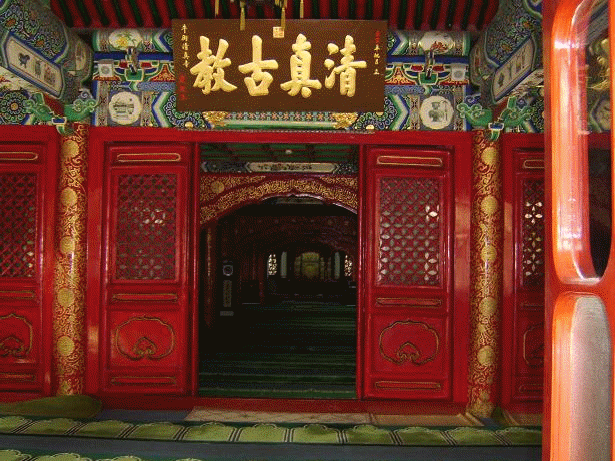
The weather is perfect. The traffic is getting worse. The crepe-omelette (jianbing) vender who sets up his cart outside the university gate has increased prices by 25%, to 2.5 RMB ($0.30) per massive crepe-omelette but he seems to have added 25% more yumminess, so I don't object. I ask Ms. Li if I am strange for finding cheap street food more delicious than expensive banquet food. “No,” she replies, “but cheap street food is informal.” My entourage knows I am keen to have a meal of jiaozi, so they take me on the hunt. Unfortunately, they understand “eat jiaozi” to mean “eat a Chinese meal with a special order of jiaozi”, while I understand “eat jiaozi” to mean “fast for a week and then have a bulldozer dump infinite quantities of infinite of varieties of jiaozi down my throat”, but they find me a restaurant that serves good jiaozi, even if the meal is more civilized than I had anticipated.
My beloved jianbing, from back when they were inexpensive...
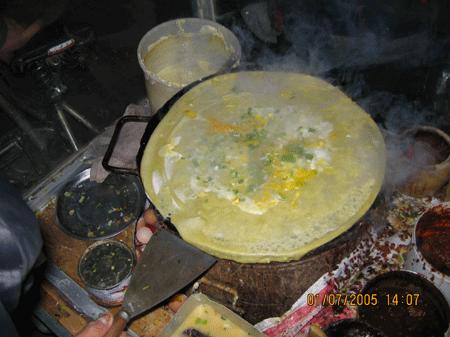
On
board waiting for the AirCanada plane to take off, my legs are very
happy because no one is sitting next to me. Luckily she had just
enough time to make the flight, but not enough time to purchase a
book to read en route. She passes the time with small talk,
tomato-juice-and-wine combos, and by shaking my shoulder to point out
to me whenever something really important happens on the in-flight
movie Fantastic Four, which has surprisingly many
really important happenings. After the movie she gets two, then
three, than four of the air crew's attention by claiming to be ill,
feeling hot, then cold, then hot, then cold. The crew suspects this
might be connected to the tomato-juice-and-wine combos (and give her
an airsickness bag—proving to be the leitmotif of the trip),
but she knows that it's really about qi, and she begs me (when the
crew's distracted) to inflict maximum pain on her by squeezing her
wrists as hard as I can, which turns out to be surprisingly easy and
cathartic (for me). In gratitude for my saving her life, she gives me
her
phone number so I can stay with her family the next time I'm in
Toronto.
About 98% of the above is true!
Many thanks to everyone who made this trip possible!
The blurry or odd pictures are mine, the rest are stolen from Friend Lidia or from the Internet!